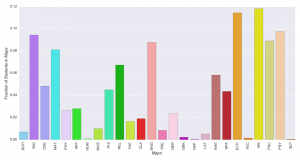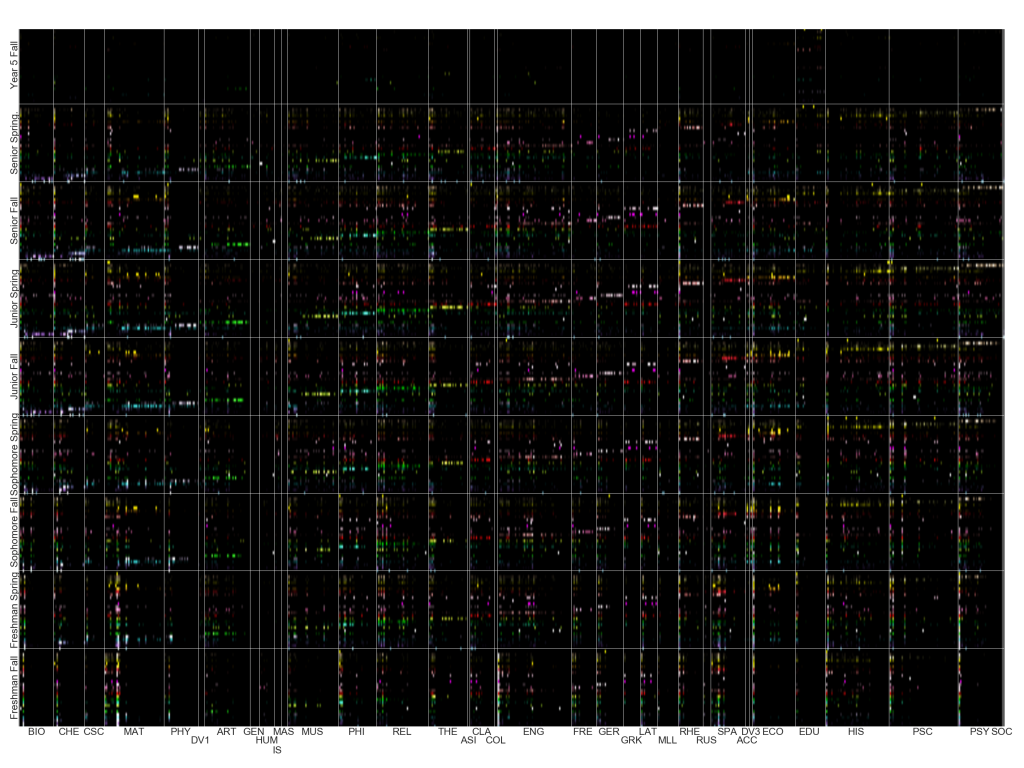In February, Rick Warner and I traveled to Ann Arbor to meet with members of the GLCA/GLAA Consortium for Teaching and Learning (CTL) to talk about the progress of the new website for the CTL, and directions for the future of the consortium. Ahead of that meeting, the program directors asked us, “What are one or two of the greatest challenges that faculty members encounter in their teaching at your college?”
Rick and I put that question out to our faculty, to help us get a better feel for the range of challenges that Wabash faculty are seeing today. In the end, we heard back from six of our colleagues, who wrote about their concerns in engaging all of our students in class discussions, how to teach large-ish survey courses where students enter with a wide range of preparation, and how to challenge students without putting them off. All of these concerns resonated with our own experiences, and with those of the other CTL members, and we hope that that the CTL can be a valuable resource in our conversations about how to engage with these and the other concerns that come up in our teaching.
And, we also noticed that across these very thoughtful responses another theme emerged, on time, or time scarcity. Lack of time, especially time for teaching, was detailed specifically in two responses, listed below:
- “I think the greatest challenge will always be time – to teach the courses we want (often we are too stretched as a department to allow flexibility) and to develop them thoughtfully and carry them out well in balance with research and service.” – Laura Wysocki, Department of Chemistry
- “Finding time to invest in preparing and, more importantly, revising lesson plans. I often find myself reusing a lesson plan from the past that I know I could improve but don’t have the time to devote to doing so. I have to give priority to a new lesson prep because, well, there is no existing lesson plan to lean on!” – Jennifer Abbott, Department of Rhetoric
In Ann Arbor, when we discussed our responses and those from other colleges at the GLCA/GLAA meeting, we found that time emerged as an common concern. And, I can’t say that we were surprised by this: as we entered this discussion, everyone did assume that faculty would report feeling pressed for time. We have made similar observations at Wabash, notably in 2013-14, when we spent some time surveying faculty about their job satisfaction. Stress about time emerged from those conversations as well, though mostly related to research and scholarship. But, faculty also expressed their desire fro more time for time to work with students, which seems to overlap with the concerns we saw at the CTL meeting.
But, while it not a surprise that faculty feel that time is a challenge in our teaching, I do think it is important that we not simply accept this situation as a given, as some universal feature of faculty life. Instead, especially after reading Berg and Seeber’s recent book, The Slow Professor, this semester, I think that we should use these concerns as an opportunity to ask what we can do to better prioritize time for teaching. As part of this process, I think it is important that as individual faculty members, and as a college, that we continue to look for ways to support reflective faculty development on our teaching.
For instance, as a college, I think we should continue to ask ourselves:
- How do we support our faculty in their efforts to develop and reflect on teaching? And, how can we improve on our existing efforts?
- How do our reward structures (tenure, promotion, salary review) focus on exemplary and reflective teaching?
As individual faculty members, I think we should also continue to take advantage of the resources, in our own community and externally, to help us refine and reflect on our teaching. Informal conversations about teaching are invaluable in our community, and a key part of our faculty development. I would also suggest making use of a few more structured opportunities:
- Consider participating in the Peer Observer Program (POP)
- Meet with colleagues to discuss the results of mid-semester feedback and end of course evaluations.
- Join a book discussion with other faculty and staff, to spend time reading and thinking about a work that can inform our teaching. In 2016-17, a group of faculty met in the fall to discuss Rose’s The End of Average, and in the spring, another group met to discuss Cain’s Quiet.
- Departments can devote a portion of regular meetings to talking about teaching experiences or strategies that department members are experimenting with.
- Many disciplines have journals dedicated to teaching and learning (for examples, see this list, maintained by the Center for Excellence in Teaching and Learning at Kennesaw State University).
And, while I am happy to offer a few ideas on how to help support our faculty in finding time to focus on teaching, I also acknowledge that the perception of time scarcity is not a “problem” that we can “solve” permanently through any of the strategies listed above. When we see that a diverse set of institutions (such as our GLCA/GLAA peers, who have a wide range of teaching, scholarship and service loads) all share the perception that time to reflect and focus on our teaching is scarce, then this would suggest that simply changing one dimension (teaching load, service, etc.) will not likely change our satisfaction in a lasting way. Instead, creating space by removing one thing (through a reduction in teaching or service), will lead to other activities creeping into that void.
However, I do think this is an important issue, and one we need to address even if there are no easy, or permanent, solutions. As a liberal arts college, our main concern in our work is the education of our students. So, it is a critical concern for us to continue to find space for faculty to reflect on teaching, to refine and develop new courses, and to grow as teachers.
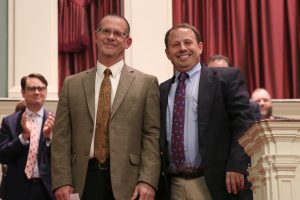 Citation by Dean Scott Feller: Tonight, I am honored to announce the recipient of the 2019 McLain-McTurnan-Arnold Excellence in Teaching Award. The tradition has been for long citations, cleverly worded tributes crafted by the Dean of the College. By necessity that changed when I became the Dean. My award citations are shorter, and much less creative, but no less deeply felt. To honor a faculty colleague with this award is one of the highlights of my work as Dean. And this year’s winner is someone who I greatly admire, a teacher whose dedication to our students, to our college, and to our world, serves as a model for all of us.
Citation by Dean Scott Feller: Tonight, I am honored to announce the recipient of the 2019 McLain-McTurnan-Arnold Excellence in Teaching Award. The tradition has been for long citations, cleverly worded tributes crafted by the Dean of the College. By necessity that changed when I became the Dean. My award citations are shorter, and much less creative, but no less deeply felt. To honor a faculty colleague with this award is one of the highlights of my work as Dean. And this year’s winner is someone who I greatly admire, a teacher whose dedication to our students, to our college, and to our world, serves as a model for all of us.
.jpg)
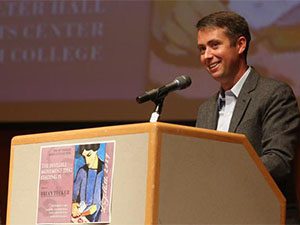
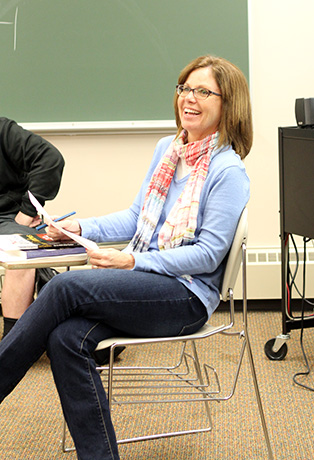 Citation by Dean Scott Feller: Dr. Michelle Pittard’s impact on the campus is not limited to the classroom or office hours. She supports our students in all their endeavors, support that continues after they graduate as they go on impact the lives of their own students. It is fair to say that this year’s winner touches the lives of every Wabash student through her tireless commitment to our all-college courses. As a faculty leader she strengthens the college in important ways.
Citation by Dean Scott Feller: Dr. Michelle Pittard’s impact on the campus is not limited to the classroom or office hours. She supports our students in all their endeavors, support that continues after they graduate as they go on impact the lives of their own students. It is fair to say that this year’s winner touches the lives of every Wabash student through her tireless commitment to our all-college courses. As a faculty leader she strengthens the college in important ways.
